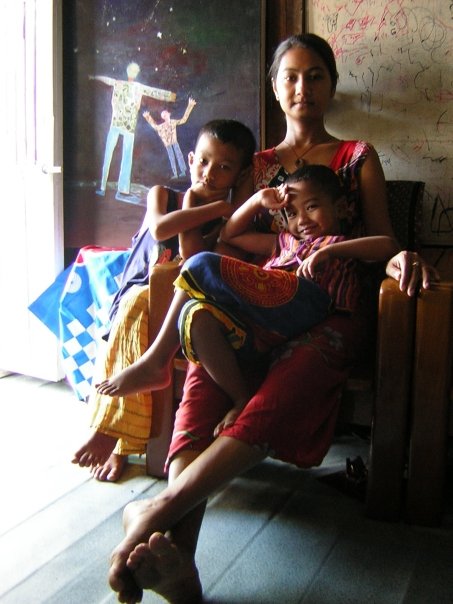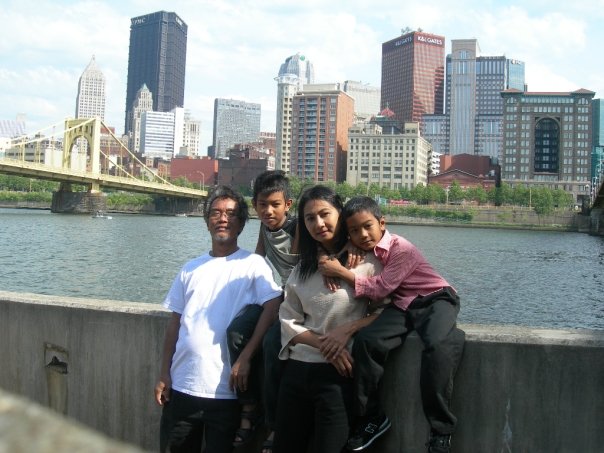









| Please click on the magazine to open it. | |
| |
Elizabeth Hoover |

Arriving here in March 2009, Khet Mar, City of Asylum/Pittsburgh’s current writer-in-residence, journeyed with her family on a 45-hour trip from her home in Rangoon, Burma all the way to Sampsonia Way. Living with her husband Than Htay Maung and two sons, Khet Mar has resided on Sampsonia Way now for just over a year.
Since she was young, Khet Mar has written short stories, essays, and poems and continues to do so today on Sampsonia Way. Currently writing a short story, she is preparing to write her very second novel. But, at this point she is still trying to organize her thoughts.
Coming up in July, Khet Mar plans to partake in two readings of her previous work. She normally takes part in readings at local high schools, universities, museums, and at literary discussions about the Burmese community.
One of Khet Mar’s most recent hobbies since moving to America has been her garden.
“I’m currently planting flowers and vegetables in my backyard. I love gardening and seeing flowers grow. I walk in my neighborhood’s streets almost everyday and see the flowers that others have planted. I enjoy doing this a lot. One of my favorite places is my garden, where I can talk with the flowers and the plants. Another favorite place of mine is the bedroom, where I can travel in my thoughts and where I can just read.”

Khet Mar and her family in front of downtown Pittsburgh
Photo: © Khet Mar
Khet Mar’s family is making sure they keep equally as busy with their new lives in Pittsburgh. While Khet Mar writes, her husband is painting a mural on the side of their home, and their children attending school and will soon go to summer camp. Both Khet Mar and her husband are studying at the GPLC (Greater Pittsburgh Literary Council) to help improve their written and spoken English.
“My family likes Pittsburgh very much. I like it too. A class mate of mine, who came here from Poland, told me she feels like the people from Pittsburgh are not welcoming to her family. I do not know what the difference is between her family and my family because not only the people of Pittsburgh but, also the rivers, bridges, trees and flowers welcomed us warmly.”
“Sometimes, I am thinking that I am in a dream. As a young woman who grew up in a fishing village and learned how difficult it was to survive; I never expected that kind of life I now have at City of Asylum/Pittsburgh. Now I am living safely and peacefully in the most livable city in the US. Our luck is very difficult to believe.”
Myanmar floods and landslides triggered by incessant monsoon rains in Myanmar and Bangladesh have killed more than 100 people.
Myanmar floods and landslides triggered by incessant monsoon rains in Myanmar and Bangladesh have killed more than 100 people. In this photo taken Wednesday, June 16, a resident wades through floodwaters in Maungdaw, Rakhine State in the western part of Myanmar.
AP
Floods and landslides triggered by incessant monsoon rains in Myanmar and Bangladesh have killed more than 100 people, officials and reports said Thursday.
Skip to next paragraphAt least 46 people died Tuesday in Myanmar's northern Rakhine state, according to the state-run Myanma Ahlin newspaper. Rescue workers are pulling residents out of the worst-affected areas and trying to open a key road damaged in the torrents. Bridges in the region have also been washed out.
State television reported Wednesday that 28 of the people were killed when houses built on mountains collapsed in landslides in Buthidaung, 360 miles (575 kilometers) northwest of Yangon, and 18 others died in Maundaw, south of Buthidaung.
Meanwhile, across the border, Bangladesh recovered three more bodies overnight in the southeastern Cox's Bazar district, raising the death toll from powerful landslides to 56, said local magistrate Mohammad Jasim Uddin. Rains in the area have now stopped, he said.
Flooding is common in both countries during the monsoon season that typically starts in late May. Cyclone Nargis struck both countries in May 2008, devastating large swaths of Myanmar where it left more than 140,000 people dead or missing.

Aung San Suu Kyi
The UN Special Rapporteur on the Human Rights Situation in Myanmar, Tomás Ojea Quintana, said in a statement that the country should “heed the call” of the UN Working Group on Arbitrary Detention, which recently reiterated earlier calls for Ms. Suu Kyi’s release.
 Myanmar: Townships With Known Hazards of Antipersonnel Landmines (as of 15 Jun 2010) (PDF, 686... ReliefWeb - Maps 08:25
Myanmar: Townships With Known Hazards of Antipersonnel Landmines (as of 15 Jun 2010) (PDF, 686... ReliefWeb - Maps 08:25  Northern Blend: Rainbow of cultures benefits from driver's ed class Greeley Tribune, Colorado - Local News 08:17
Northern Blend: Rainbow of cultures benefits from driver's ed class Greeley Tribune, Colorado - Local News 08:17  Flooding, landslides kill nearly 50 people in Myanmar; northwestern areas being evacuated Fox News Channel 06:45
Flooding, landslides kill nearly 50 people in Myanmar; northwestern areas being evacuated Fox News Channel 06:45  Flooding, landslides kill nearly 50 people in Myanmar; Bangladesh toll rises to 56 Baltimore Sun 06:28
Flooding, landslides kill nearly 50 people in Myanmar; Bangladesh toll rises to 56 Baltimore Sun 06:28 